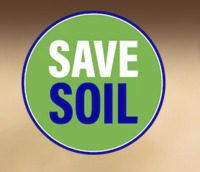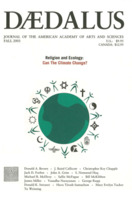Search
135 items
-
The Clan of One-Breasted Women
In this excerpt, Terry Tempest Williams reflects on her family's long-running history of developing cancer that traces from nuclear testing in Nevada. Williams emphasizes her experience of coming to terms with deviating from Mormon norms if it means advocating for the U.S. government to take responsibility for liabilities regarding human health. Williams decides blind obediance will not get her anywhere, and she needs to start asking questions. -
Save Soil
This resource details a campaign to improve soil practices to be more sustainable through building up consciousness. The leader of this movement is Sadhguru, a spiritual leader. Sadhguru advocates for connecting inner spiritual processes to an affinity for nature. This is an international organization that started in Tamil Nadu, India. -
Self Portrait
"This 35mm film photo is a self portrait taken on Rachel Carson Way in Ithaca, NY. To me, sustainability is taking small actions every day to better the people and the planet. This photo is representative of many sustainable actions I take in my day to day life, including shopping second hand, buying from small businesses, supporting local artists, supporting women in science, and traveling ethically."
Taken by Lydia Derrico. Submitted to the RESTORExchange Sustainability Contest. -
Envisioning the Daoist Body in the Economy of Cosmic Power
"From a sociological perspective, religious traditions represent and construct the collective values and systems of meaning of human societies. As such, religious traditions influence the way their adherents interpret their experience of the world and, consequently, influence their actions upon it. Religious ideologies, however, are themselves always in medias res. Even though their adherents may uphold an eternal vision of archaic principles handed down from the gods, in actuality this vision is continuously renegotiated and reconstructed in conversation with the changing demands of historical and cultural context." -
Collective Liberation
"An activist protesting the violence in Gaza holds a sign calling for collective liberation for all . What speaks sustainability about this to me is how something is being reused , for a greater cause , in the cardboard , which instead of being thrown away is being used to uplift . The Palestinian cause is one of not only liberation of a peoples but liberation of the land. Palestinian culture is rooted in sustainabile agriculture practices , and sustainability within familia systems ." Taken by Paul Hill. Submitted to the RESTORExchange Sustainability Photo Contest. -
Fifth National Climate Assestment, Chapter 16: Tribes and Indigenous Peoples
In this chapter of the Fifth National Climate Assessment, the NOAA outlines and describes three key messages regarding the relationship between Native communities in the U.S and our changing environment. This report goes over how Indigenous peoples face a high risk of changing livelihoods due to climate change and environmental injustice, and how they are responding to these threats. The report also explains the nature of their resilience to such change and how Indigenous leadership can guide our response to climate change. -
Greening the Parish - Greek Orthodox Archdiocese of America
Greening the Parish is an initiative started by the Department of Inter-Orthodox, Ecunemical and Interfaith relations. It was inspired by the work of Patriarch Bartholomew, who is more commonly known as the Green Patriarch. On this website, there are initiatives, practices, and educational materials that teach environmental stewardship. -
From Egoism to Ecoism: Psychedelics Increase Nature Relatedness in a State-Mediated and Context-Dependent Manner
This article describes the correlations between psychedelic use and nature relatedness. The surveyors used questionnaires 1 week before, 2 weeks after, 4, and 2 years after the dose given. They concluded that due to the consistent positive affects on the subjects, the use of psychedelic treatment bears relevance on mental and planetary health. -
Traditional Ecological Knowledge: Learning from Indigenous Practices for Environmental Sustainability
In this book, a number of scholarly writers share their works regarding Indigenous culture and environmentalism. There are a total of four parts that discuss Indigenous practices, ecological ethics, and nature-human relationships. The compilation of these viewpoints and topics makes for a compelling read and push towards a greener, sustainable Earth. -
Jessica Locke on Buddhism and Environmental Engagement
In this podcast, Jessica Locke begins her talk about the intersectionality of Buddhist religion and environmental engagement by describing how upholding tradition while trying to address modern issues is difficult. There are different Buddhisms, as the original religion has been interpreted differently over the years; however there are commonalities throughout such as the idea of karma. Locke states that the unit of analysis for Buddhist ethics is changing from an individualistic perspective to larger scale in order to analyze environmental problems.










